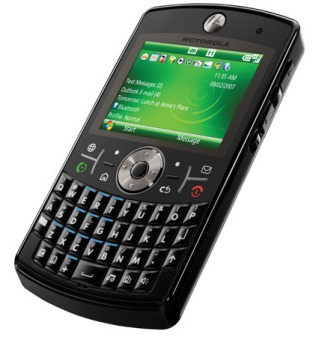 So I wrote Motorola recently to see if they would like to cooperate in my effort to port Linux and Android to the Q9h, and although a couple of engineers on the motodev site seemed enthusiastic, I still haven't heard any kind of definitive reply.
So I wrote Motorola recently to see if they would like to cooperate in my effort to port Linux and Android to the Q9h, and although a couple of engineers on the motodev site seemed enthusiastic, I still haven't heard any kind of definitive reply.The next logical step was to disassemble a broken Motorola Q9h I found on eBay :) I'm not entirely finished this tear-down yet, because I'm still trying to pry-off a few remaining EMI shields, but its coming along smoothly.
I'd have to say, that I'm amazed with all of the components that went into this device from various vendors. Of course, there's the TI OMAP2420, a TI power management chip, some Samsung memory, Elpida memory, a Broadcom (I'm guessing bluetooth) transceiver, several FreeScale parts that I haven't yet identified, the SiRF 5000 AGPS receiver, a few random sensors (ambient light, ...), etc.
I'll be specifically looking for a 'companion chip' sort of like the TWL4030, to see what I can get out of the USB pins. I believe that D+ / D- are not fully muxed with UART2, but they are with GPIO 107 / 108, which means I might have to write a small soft-uart driver for the Linux kernel.
Most of the Linux-OMAP code for the 2420 device is already present upstream in the kernel (mainly written by Nokia engineers), so in terms of the Linux porting effort, it's really just a matter of configuration. There may be a couple of non-standard peripheral devices, but I'm not expecting any major difficulties.
I hope you eagerly await some photos of the internals :) I'll have to take a pause in order to get back to the library and resume studying for my wireless communication exam, but I should be done the teardown in another day or two.
Wish me luck!
Update-20091002: Teardown
Update-20091002: OpenEZX Page




